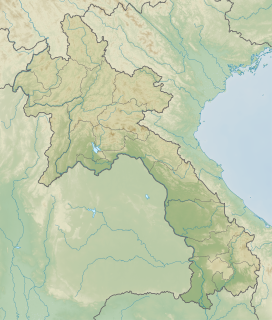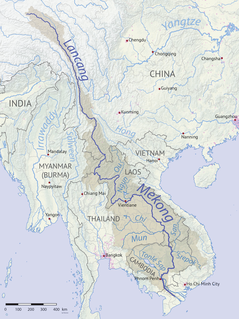
The United Nations Economic Commission for Europe is one of the five regional commissions under the jurisdiction of the United Nations Economic and Social Council. It was established in order to promote economic cooperation and integrations among its member states.

The Mekong, or Mekong River, is a trans-boundary river in East Asia and Southeast Asia. It is the world's tenth longest river and the sixth longest in Asia. Its estimated length is 4,909 km (3,050 mi), and it drains an area of 795,000 km2 (307,000 sq mi), discharging 475 km3 (114 cu mi) of water annually. From the Tibetan Plateau the river runs through China, Myanmar, Laos, Thailand, Cambodia, and Vietnam. The extreme seasonal variations in flow and the presence of rapids and waterfalls in the Mekong make navigation difficult. Even so, the river is a major trade route between western China and Southeast Asia.

The Mekong River Commission (MRC) is an "...inter-governmental organisation that works directly with the governments of Cambodia, Laos, Thailand, and Vietnam to jointly manage the shared water resources and the sustainable development of the Mekong River". Its mission is "To promote and coordinate sustainable management and development of water and related resources for the countries' mutual benefit and the people's well-being".
Environmental issues in Vietnam are numerous due to the effects of the Vietnam War, as well as the country's rapid industrialization following the economic reforms in 1986 known as Doi Moi. According to the State of the Environment 2001 published by the government, the main issues are land degradation, forest degradation, loss of biodiversity, water pollution, air pollution and solid waste management. More recently, climate change was added as a major concern because Vietnam is considered to be one of the most seriously impacted by climate change according to a World Bank study in 2007.
The East–West Economic corridor is an economic development program initiated in order to promote development and integration of 5 Southeast Asian countries, namely: Myanmar, Thailand, Laos, Cambodia and Vietnam. The concept was agreed upon in 1998 at the Ministerial Conference of the Greater Mekong Subregion, organized in Manila, the Philippines. This corridor became operational on December 12, 2006.

The Greater Mekong Subregion, (GMS) or just Greater Mekong, is a trans-national region of the Mekong River basin in Southeast Asia. The region is home to more than 300 million people. It came into being with the launch of a development program in 1992 by the Asian Development Bank that brought together the six Asian countries of Cambodia, China, Laos, Myanmar (Burma), Thailand, and Vietnam.

Landscape-scale conservation is a holistic approach to landscape management, aiming to reconcile the competing objectives of nature conservation and economic activities across a given landscape. Landscape-scale conservation may sometimes be attempted because of climate change. It can be seen as an alternative to site based conservation.

Cambodia is one of the world's most forest endowed countries that has not yet been drastically deforested. However, massive deforestation for economic development threatens its forests and ecosystems. As of 2015, the country has one of the highest rates of deforestation in the world.
China has set the goal of attaining one percent of its renewable energy generation through bioenergy in 2020.

The Asia-Pacific Research and Training Network on Trade(ARTNeT) is an open regional network composed of leading trade research institutions across the United Nations Economic and Social Commission for Asia and the Pacific (ESCAP) region, and supported by the International Development Research Centre (IDRC) and Agence française de développement (AFD).
Responsible tourism is a relatively modern concept in the Kingdom of Thailand that took root in the late-1990s. It is underpinned by the belief that tourism should develop in a manner that minimizes negative impacts on local communities, and wherever possible ensure that a positive symbiosis exists between hosts and visitors. Responsible travel promotes a respect for indigenous culture, the minimization of the negative environmental impacts of tourism, active participation in volunteering to assist local communities, and the structuring of businesses to benefit the final service provider rather than an international agent.

The estimated hydropower potential of the lower Mekong Basin is 30,000 MW, while that of the upper Mekong Basin is 28,930 MW. In the lower Mekong, more than 3,235 MW has been realized via facilities built largely over the past ten years, while projects under construction will represent an additional 3,209 MW. An additional 134 projects are planned for the lower Mekong, which will maximize the river's hydropower generating capacity. The single most significant impact—both now and in the future—on the use of water and its management in the Mekong Region is hydropower.

The Sambor Dam is a proposed dam and hydroelectric power station on the Mekong River south of Sambor village in Prek Kampi District, Kratie Province, Cambodia. If built, it would be the lowest dam of the Mekong's mainstream dams, and largest in Cambodia.
The Stung Battambang 1 is a dam planned for construction on the Battambang River in Cambodia. The river is a major tributary of the Tonlé Sap. Of the two dams planned for this river, the larger is the Stung Battambang 1. A letter of commitment has been issued by the Cambodian authorities for a pre-feasibility study of the dam by an unknown Korean company

The Xayaburi Dam is a run-of-river hydroelectric dam on the Lower Mekong River, approximately 30 kilometres (19 mi) east of Sainyabuli (Xayaburi) town in northern Laos. Commercial operation of the dam started in October 2019. The main purpose of the dam is to produce hydroelectric power, 95% of which is to be purchased by the Electricity Generating Authority of Thailand (EGAT). The project is surrounded in controversy due to complaints from downstream riparians and environmentalists. Preliminary construction began in early-2012, but work on the dam itself was suspended shortly thereafter due to complaints from Cambodia and Vietnam downstream. After making modifications to the dam's design, Laos started construction with a ceremony on 7 November 2012. The Xayaburi Dam is the first of the 11 dams planned on the lower Mekong.

The Sustainable Mekong Research Network (SUMERNET) is a network of organizations committed to the sustainable development of the Greater Mekong Region. Launched in 2005, SUMERNET supports policy-relevant research and outreach activities to inform and engage policy-makers, planners and stakeholders. Within this context, it pursues an evolving agenda in response to questions and policy issues that arise in the region. Current research themes are climate-compatible development, regional economic integration, and ecosystem services and local development. The network works on a range of issues including natural ecosystems governance, floods and natural disasters, climate change and adaptation, and transboundary resource flows.
eWater is a non-profit organisation established by Australian Federal and State Governments. The role of eWater is to support integrated water resources management in Australia through development and implementation of the national hydrological modelling strategy (NHMS).
Economic corridors are integrated networks of infrastructure within a geographical area designed to stimulate economic development. They connect different economic agents in particular geographic area. Corridors may be developed within a country or between countries. Corridors exist in Asia, Africa, and other areas.
Mekong Institute (MI) is an intergovernmental organization (IGO) run by six governments in the Greater Mekong Sub-region (GMS): Cambodia, China, Laos, Myanmar, Thailand and Vietnam. MI delivers various programs and activities focusing on human resource development and capacity building for regional cooperation and integration.

Laos is a nation with plentiful surface water and broad rivers, but outside of cities there is little infrastructure to make that water clean and accessible. Very little improvement has been made since the end of the Laotian Civil War in 1975, especially compared to peer nations such as Thailand. By 2015, 76% of Laotians nationwide were estimated to have access to “improved” water, while 71% were estimated to have access to “improved” sanitation.











